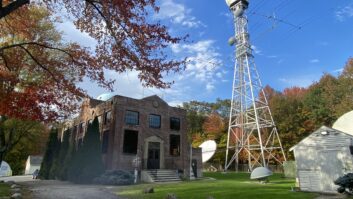The Federal Communications Commission has been presented with an unusual request by a Texas AM radio station: establish a new nighttime-only broadcast tower that would be 5 kilometers/3 miles farther from its community of license.
Total Austin Sports Radio asked the FCC for permission to establish a new nighttime antenna and transmitter at a different tower — one totally separate from its daytime tower that’s presently located in Taylor, Texas, which is currently used to broadcast KTAE(AM).
KTAE is a Class D AM station with 1 kW of daytime power and 0.144 kW of nighttime power. Both signals currently originate from its transmitter site in Taylor, which is approximately 29 kilometers/18 miles from Elgin. As it stands today, KTAE’s nighttime service is secondary, is not protected from interference from other AM stations, and its nighttime interference-free contour does not currently cover any part of the community of Elgin.
According to Total Austin, the new proposed nighttime service would originate from a site within the city limits of Austin, Texas, which is about 48 kilometers/30 miles away from the transmitter currently based in Taylor.
This isn’t the first time the owner of KTAE has proposed making a change. In 2009 KTAE’s then-licensee BMP Austin License Co. filed two applications. The first proposed to relocate Elgin’s then-only local transmission service KVLR(FM) to Sunset Valley, Texas (the station was then licensed to BMP). The second application proposed to change KTAE’s community of license from Taylor to Elgin without changing the station’s transmitter site to backfill the community of Elgin’s loss of KVLR(FM) and its sole local transmission service. FCC staff granted the applications, finding that creating a local transmission service in Sunset Valley was preferred vs. retaining a second transmission service in Taylor.
Total Austin now seeks to relocate the station’s nighttime service from its current location at the KTAE transmitter in Taylor to an existing tower used for station KTSN(AM) in Austin and to slightly increase the power to 0.2 kW nighttime. The station’s daytime antenna and coverage would remain unchanged.
According to Total Access, this proposal will “maximize the service to Elgin and the surrounding market area,” and “will provide an improved service to the community of Elgin and its market area.”
But the Audio Division at the Media Bureau didn’t see it that way. It found that Total Austin failed to sufficiently support its proposal to move the nighttime coverage of KTAE.
Not only is the new proposed location for KTAE’s nighttime operation outside KTAE’s predicted 5 mV/m daytime principal community contour, approximately 40% of the predicted nighttime interference-free contour at the new location lies outside of KTAE’s predicted daytime 2 mV/m contour, said Albert Shuldiner, chief of the Audio Division.
Another point of contention: Total Austin did not provide any rationale for its belief that it is free to relocate KTAE’s Class D nighttime service wherever it deems appropriate. The licensee must demonstrate that grant of this application would be in the public interest. But the Audio Division found that it would not.
First, while KTAE’s Class D nighttime service is secondary and unprotected, it is nonetheless service; as a result, it has an obligation to provide the community of license with programming that serves its interests. “While a proposal to move the nighttime service closer to Elgin might indicate a commitment to this obligation, the proposed move to Austin, slightly farther from Elgin than is the current nighttime transmitter, offers no such indication and implies the opposite,” Shuldiner said.
The proposal also runs counter to the interests of the residents of Elgin, which is the station’s the community of license, Shuldiner said.
“Now, [Austin] seeks to take what little local nighttime service KTAE has and move it into the Austin UA [urbanized area] as well,” he said. “The end result is that the Austin UA gained not only an additional fulltime service in KVLR, but would also gain an additional nighttime AM service, while Elgin would remain without a local nighttime transmission service it previously enjoyed.”
“While this novel proposal offers little to nothing by way of precedent to indicate the proper result, we conclude that it likewise offers little to nothing by way of public interest benefit to the residents of the community of license, Elgin, Texas, other than a continuation of the abandonment of full-time local radio transmission service at that community,” Shuldiner wrote. As a result, the application by Total Austin to relocate the nighttime service of station KTAE was dismissed.







